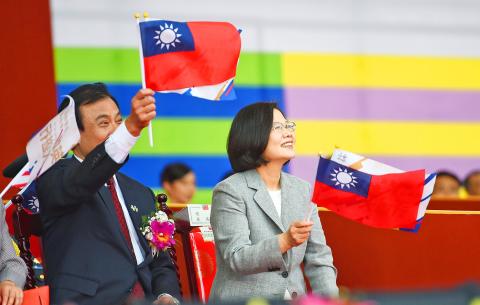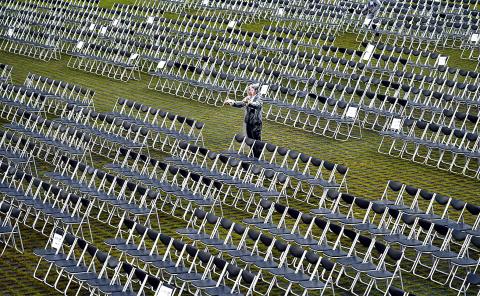President Tsai Ing-wen (蔡英文) in her Double Ten National Day speech yesterday called on China to act as a “responsible large nation” should — assuming a benign rather than quarrelsome role in the Asia-Pacific region and the world — as she vowed to maintain cross-strait peace and the democratic lifestyle of 23 million Taiwanese.
“Taiwan, at the forefront of the West Pacific, is under great pressure,” Tsai said.
China has in the past few years resorted to brow beating Taiwanese and restricting Taiwan’s international space, which has damaged cross-strait relations and is seriously challenging peace and stability across the Taiwan Strait, Tsai said.

Photo: Liu Hsin-de, Taipei Times
The redistribution of labor along the international supply chain, resulting from the US-China trade war, has disrupted international trade and increased the geopolitical complexity of the Indo-Pacific region, as well as cross-strait relations, the president said.
Some might demand a tougher stance from the government, while others wish for greater compromise, but Taiwan’s best course is to maintain stability in times of radical change, to face China’s pressure with equanimity and find a niche for survival, Tsai said.
This has been the government’s stance over the past two years, she said, adding that every responsible political figure and political party should resolve to uphold the greater consensus of the public.

Photo: Sam Yeh, AFP
The free and democratic way of life of 23 million Taiwanese — as well as efforts to ensure the sustainable development of the Republic of China, and maintain peace across the Strait and regional stability — must be continued, Tsai said.
“The government that I lead must show Taiwan’s toughness to the world,” especially when the world is overreacting to China’s rapidly expanding influence, she said.
Any unilateral attempt to change the “status quo” of cross-strait relations would never be accepted by Taiwanese, and any claim contravening universal values would never be recognized or supported by the international community, Tsai said.
Tsai guaranteed that Taiwan would not escalate tensions, but that the nation would not back down or compromise either.
“We will not move toward confrontation and conflict due to momentary passion, or move cross-strait relations toward danger — nor will we turn from the will of the people and sacrifice the sovereignty of Taiwan,” Tsai said.
Taiwan cannot afford miscalculations in times of such rapid change, she said.
“The solution is to maintain stability, remain flexible and seek advancement,” she said.
A strong nation is a prerequisite for any effective strategy, thus Taiwan must improve its national security and economic health, as well as a social safety net to make Taiwanese stronger, Tsai said.
The niche in which Taiwan can continue to survive is to become an even more indispensable member of the global community, she said.
The challenges that Taiwanese face are not limited to military threats, but also include diplomatic oppression, social infiltration and economic insecurity, she said.
The task at hand is to establish a comprehensive strategy and commence with efforts to strengthen national security, she said.
The first aspect of national security to be addressed is the strengthening of valuable diplomatic ties, and making the nation strategically invaluable, Tsai said.
During turbulent international developments, Taiwan — which is of great strategic importance geopolitically — must be resolute in its defense of democracy and the market economy, she said, adding that these things have served as the basis for Taiwan’s economic development and for the nation becoming a model of democratization in Asia, she said.
Facing pressure from China over the past two years, Taiwanese have demonstrated a high degree of resilience and determination in protecting their values, and like-minded nations have increasingly expressed their support, she said.
The second aspect to be addressed is the improvement of the nation’s defense capabilities, which involves a multi-tier approach, Tsai said.
Her stance has always been to steadily increase the defense budget each year, she said, adding that the military can satisfactorily defend the nation’s sovereign territory.
The third aspect is that the nation have a national security strategy capable of obstructing any attempt, foreign or domestic in origin, from destabilizing Taiwan’s economy, or its society, the president said.
Taiwan’s democracy must be defended at any cost — the government would not sit idly by if any country attempted to take advantage of that democracy to infiltrate and wreak havoc on Taiwanese society, she said.
Whether through the dissemination of disinformation, unauthorized acquisition of technology-related information, the compromising of information security systems or interference with the political system and elections, anyone proven to have committed such acts would be severely dealt with, she said.
The government has used international cooperation to counter the spreading of disinformation by parties in certain countries, she added.
Tsai said the lighthouse keepers, who were invited to sing the national anthem at yesterday’s ceremony, served as an analogy of Taiwan, which is like a beacon.
The nation’s democratization has been a light to outshine the darkness that Taiwanese had to pass through, and acts as a guide to all who seek democracies of their own, she said, adding that she hopes the people of Hong Kong and China be inspired by Taiwan.
“When the world sees Taiwan’s beauty, we will not be lonely,” she said.
“Taiwan will march bravely and resolutely forward. Taiwanese have always come together for the nation, deriving strength from unity,” Tsai said.

SECURITY: As China is ‘reshaping’ Hong Kong’s population, Taiwan must raise the eligibility threshold for applications from Hong Kongers, Chiu Chui-cheng said When Hong Kong and Macau citizens apply for residency in Taiwan, it would be under a new category that includes a “national security observation period,” Mainland Affairs Council (MAC) Minister Chiu Chui-cheng (邱垂正) said yesterday. President William Lai (賴清德) on March 13 announced 17 strategies to counter China’s aggression toward Taiwan, including incorporating national security considerations into the review process for residency applications from Hong Kong and Macau citizens. The situation in Hong Kong is constantly changing, Chiu said to media yesterday on the sidelines of the Taipei Technology Run hosted by the Taipei Neihu Technology Park Development Association. With

CARROT AND STICK: While unrelenting in its military threats, China attracted nearly 40,000 Taiwanese to over 400 business events last year Nearly 40,000 Taiwanese last year joined industry events in China, such as conferences and trade fairs, supported by the Chinese government, a study showed yesterday, as Beijing ramps up a charm offensive toward Taipei alongside military pressure. China has long taken a carrot-and-stick approach to Taiwan, threatening it with the prospect of military action while reaching out to those it believes are amenable to Beijing’s point of view. Taiwanese security officials are wary of what they see as Beijing’s influence campaigns to sway public opinion after Taipei and Beijing gradually resumed travel links halted by the COVID-19 pandemic, but the scale of

A US Marine Corps regiment equipped with Naval Strike Missiles (NSM) is set to participate in the upcoming Balikatan 25 exercise in the Luzon Strait, marking the system’s first-ever deployment in the Philippines. US and Philippine officials have separately confirmed that the Navy Marine Expeditionary Ship Interdiction System (NMESIS) — the mobile launch platform for the Naval Strike Missile — would take part in the joint exercise. The missiles are being deployed to “a strategic first island chain chokepoint” in the waters between Taiwan proper and the Philippines, US-based Naval News reported. “The Luzon Strait and Bashi Channel represent a critical access

Pope Francis is be laid to rest on Saturday after lying in state for three days in St Peter’s Basilica, where the faithful are expected to flock to pay their respects to history’s first Latin American pontiff. The cardinals met yesterday in the Vatican’s synod hall to chart the next steps before a conclave begins to choose Francis’ successor, as condolences poured in from around the world. According to current norms, the conclave must begin between May 5 and 10. The cardinals set the funeral for Saturday at 10am in St Peter’s Square, to be celebrated by the dean of the College